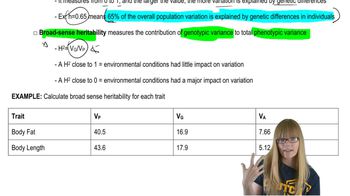Here are the essential concepts you must grasp in order to answer the question correctly.
Nucleosomes
Nucleosomes are the fundamental units of chromatin, consisting of a segment of DNA wrapped around a core of histone proteins. Each nucleosome contains about 147 base pairs of DNA. They play a crucial role in packaging DNA into a compact, organized structure, allowing for efficient storage and regulation of genetic information within the cell nucleus.
Recommended video:
10-nm Fiber
The 10-nm fiber, also known as the 'beads-on-a-string' structure, represents the first level of DNA packaging in eukaryotic cells. It consists of nucleosomes connected by linker DNA, creating a string-like appearance. This structure is essential for the initial compaction of DNA, facilitating further folding and organization into higher-order structures.
Recommended video:
Calculation of Nucleosomes
To estimate the number of nucleosomes required for the human genome, one can divide the total number of base pairs by the number of base pairs per nucleosome. Given that the human genome has approximately 2.9×10⁹ base pairs and each nucleosome contains about 147 base pairs, the calculation would be 2.9×10⁹ / 147, yielding an approximate number of nucleosomes needed to organize the genome into the 10-nm fiber structure.
Recommended video:
 Verified step by step guidance
Verified step by step guidance Verified video answer for a similar problem:
Verified video answer for a similar problem:

